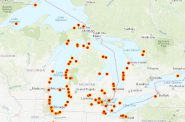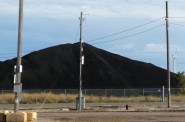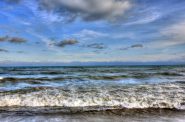Lake Michigan Carpeted With Quagga Mussels
Search using GoPro cameras documents the problem.
Scientists using GoPro cameras in Lake Michigan have found the lakebed coated in invasive quagga mussels.
The GoPros are attached to a small dredge used to sample the lakebed in what’s called a “grab.” Called a Ponar dredge – the device has long been used to research lake bottoms. It takes a scoop of sand, mud and mussels for analysis. The addition of the camera helps guide the grab.
As you watch the video, pay attention to the point right after the dredge starts to rise. You can see the continuous spread of mussels just before the lakebed fades to green.
“The mussels get more sparse as you get deeper, but it’s like a continuous carpet across the lake,” said Ashley Elgin, a benthic ecologist at the Great Lakes Environmental Research Laboratory. “It’s not just this one patch where you dropped your camera down. It’s continuous.”
Since Ponar grabs to measure mussels started in the 1980s, scientists have seen a boom in quagga mussels.
The numbers peaked and then declined, but are still relatively high, Elgin said.
They’ve largely displaced another invasive species, the zebra mussel.
Scientists started using GoPros on their equipment in 2015.
There’s no way to re-shoot the video once the dredge is done. Murky water, bad weather and blocked camera lenses make visibility difficult.
Getting a sense of scale is also difficult, Elgin said.
But the benefits outweigh the challenges, according to Ron Muzzi, another member of the lab operated by the National Oceanic and Atmospheric Administration. Getting visual data on the mussels is helpful in figuring out where they pose the greatest risk.
Quagga mussels arrived in the Great Lakes in ships’ ballast water. They affect the environment by filtering water to eat phytoplankton, microscopic plants that make prime food for the base of the food web. A single mussel can’t filter much water, but together they make a much larger impact.
Researchers do three grabs at each sampling location to make sure their readings are accurate. The cameras help them see if the grabs they take are good representations of the area.
“A Ponar is a blind pinprick,” Elgin said. “You could drop your Ponar into one of the open patches, come up with almost no mussels and get an incorrect view of the density down there. You just get one grab, and you don’t know what else is around it unless you have that video.”
Cameras are also used in other aquatic research. For example, one is set up near Muskegon and takes a video every hour to track mussels and fish.
A version of this story was originally published by Great Lakes Echo.
Great Lakes Echo
-
Tracking Balloon Debris in Great Lakes
 Dec 3rd, 2019 by Tasia Bass Cont
Dec 3rd, 2019 by Tasia Bass Cont
-
Coal Ash Pollutes Midwest States
 Jun 5th, 2019 by Andrew Blok
Jun 5th, 2019 by Andrew Blok
-
Extreme Changes Forecast for Great Lakes
 May 21st, 2019 by Cassidy Hough
May 21st, 2019 by Cassidy Hough





















3 lb. 5 oz. mussels
2 cups lager or light beer
2 onions, chopped
5 garlic cloves, chopped coarsley
1 fresh green chili (jalapeno or serrano) deseeded
and thinly sliced.
1/2 cup fresh tomatoes, diced or canned, chopped
2 – 3 tbsp. chopped fresh cilantro
1. scub the mussels under cold running water to remove any mud. Using a sharp knife, cut away the feathery “beards” from the shells. Discard any open mussels that do not shut when tapped sharply with a knife. Rinse again in cold water.
2. Place the lager, onions, garlic, chili, and tomatoes in a heavy based pan. Bring to a boil.
3. Add the mussels and cook, covered, over a medium high heat for about 10 minutes until the shells open. Discard any mussels that do not open.
4. Ladle into individual bowls and serve sprinkled with fresh cilantro.
VARIATIONS: Add the kernals from 2 ears of corn to the lager mixture in step 2. A pinch of sugar might be needed to bring out the sweetness of the corn.
http://www.getbentsportfishing.com/community/threads/quagga-mussels-cooked-with-lager.17290/
Problem is that mussels in lake Michigan are contaminated with toxic metals.
Ssssshhhh Jake! No go right ahead and gobble up those delicious Quagga mussels Republicans! Them’s good eatin’! Specially wit a lot of beer on yer boat…
Real funny, Ingrid. Why not come up with a recipe substituting rusty crayfish for lobster? BTW, the quagga mussel is about the size of a thumbnail. Why not volunteer to scuba dive to the bottom of the lake to harvest them?
When I pulled my boat out last year every crevice around the engine was jam packed with little muscles. I thought they were Zebra but maybe they were Quagga. I had to pay someone with the right equipment to get them out. I have photos if UM wants them.
All the Republicans in Minnesota love coming to Wisconsin to go boating. Going to the lake in Minnesota these days is like having a full cavity search just putting your boat in and out of the lake and they all cry, but over in Scott Walker’s Wisconsin you can p#ss, sh@t, dump oil and gas in the lake and never pull your plugs or have the boat inspected for invasive species.
…oh yeah but then they head back to Minnesota so they can have paved roads, great affordable health care and educated kids. Wisconsin is just Minnesota’s recreational toilet these days. Thank your governor